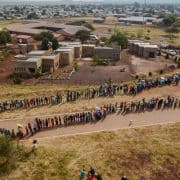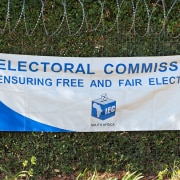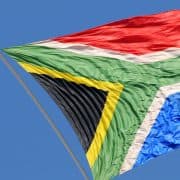|
Getting your Trinity Audio player ready...
|
Survey results released last week indicate that the majority of South Africans are dissatisfied with the way democracy works in their country – this is according to Afrobarometer, who polled residents’ satisfaction with democracy during November and December 2022.
Furthermore, few citizens see the country as a well-functioning democracy, with a growing majority saying they would be willing to “forgo elections in favour of an unelected but efficient government that delivers security, jobs, and housing”. This, says Afrobarometer, has been the majority view in all survey rounds since 2006 – however, it reached a new high in 2022, with citizens struggling to keep their heads above water in the health and economic crises which have only been exacerbated by Covid-19 and the Russia-Ukraine war.
With national elections coming up in 2024, this does not bode well, especially for the governing party.
The findings follow on from an Independent Electoral Commission (IEC) survey on attitudes towards electoral democracy, which was released in September 2022. Those findings, in turn, echoed those of non-profit organisation Freedom House of a consecutive year-on-year decline, over the past 16 years, in the numbers of countries that have remained democratic versus those that have shown some elements of reversal.
“There has been growing debate about both the quality as well as the performance of democracy across countries,” said researcher Dr Ben Roberts, introducing the IEC survey results. “There’s also been evidence of mounting public discontent and its particular bearing on different aspects. of political legitimacy, as well as political behaviour.”
In the last handful of years, Roberts said, there is increasing evidence of deterioration in both democratic norms and institutions, coupled with the rise of authoritarian tendencies in certain parts of the world.
South Africa, as shown in the Afrobarometer survey, is experiencing the same trend. Respondents are not happy with the benefits of democracy as they experience it. Seven in 10 (70%) of respondents are dissatisfied with the way democracy works in the country, while 25% say they are fairly or very satisfied.
In terms of the quality of South Africa’s democracy, only 33% of citizens consider South Africa “a full democracy” (11%) or “a democracy with minor problems” (22%). In contrast, fully 63% say the country is “a democracy with major problems” (49%) or is “not a democracy” (14%).
A fully functioning democracy, according to the European Center for Populism Studies, is one where “civil liberties and fundamental political freedoms are not only respected but also reinforced by a political culture conducive to the thriving of democratic principles. These nations have a valid system of governmental checks and balances, an independent judiciary whose decisions are enforced, governments that function adequately, and diverse and independent media.”
Fully democratic nations have only limited problems in democratic functioning.
This is not the respondents’ view of South Africa.
Political party? What political party?
A minority of respondents – only 37% – admit to feeling close to any political party. The remaining 67% do not feel close to any of the parties represented on our political landscape. Among the minority who do identify with a political party, slightly more than half (52%) say they feel close to the African National Congress (ANC), 17% say the Democratic Alliance (DA), 12% the Economic Freedom Fighters (EFF), and 7% the Inkatha Freedom Party (IFP).
In a hypothetical election, 32% of respondents indicate they would vote for the ANC, 12% for the DA, and 11% for the EFF. But 38% were not sold on the idea of voting at all or did not disclose their voting intention – 14% say they would not vote, 9 % say they don’t know how they would vote, and 15% refuse to say how they would vote.
These sentiments may be influenced by South Africans’ greatest worry – unemployment – and the inability of government to urgently address it. More than half of respondents (52%) named this as one of their three priorities. The other priorities are crime/security (38%), electricity (32%), water supply (21%), and corruption (19%).
So dire is the situation that 46% of respondents say they would be very willing to forgo elections, and 26% say they would be willing to do the same. They were responding to the question: “If a non-elected government or leader could impose law and order, and deliver houses and jobs, how willing or unwilling would you be to give up regular elections and live under such a government?”








